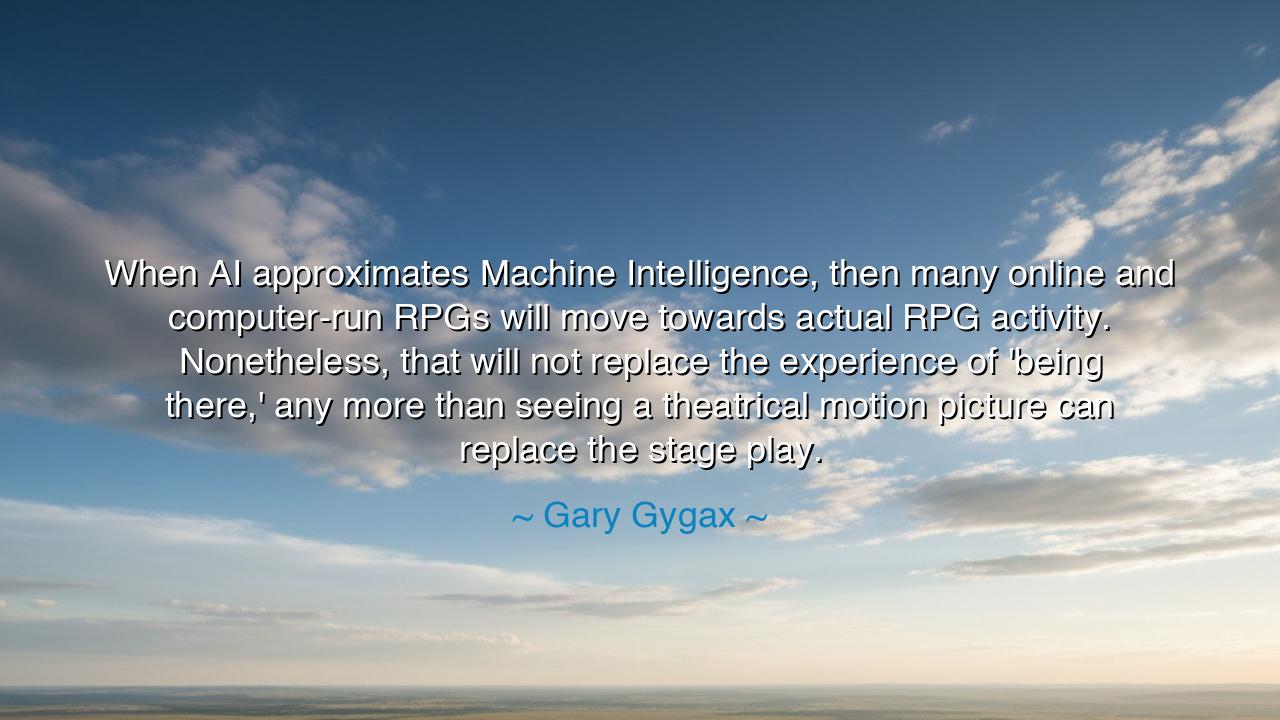
When AI approximates Machine Intelligence, then many online and
When AI approximates Machine Intelligence, then many online and computer-run RPGs will move towards actual RPG activity. Nonetheless, that will not replace the experience of 'being there,' any more than seeing a theatrical motion picture can replace the stage play.






The words of Gary Gygax, “When AI approximates Machine Intelligence, then many online and computer-run RPGs will move towards actual RPG activity. Nonetheless, that will not replace the experience of ‘being there,’ any more than seeing a theatrical motion picture can replace the stage play,” resound with both foresight and humility. They are the reflections of a visionary—the co-creator of Dungeons & Dragons, a man who gave form to imagination itself. Yet in these words lies not the pride of invention, but the wisdom of restraint. For Gygax saw beyond the glittering promise of machines, into the unchanging truth of the human heart. He reminds us that while technology may simulate experience, it cannot embody it; that while intelligence may be approximated, the spark of presence, of shared creation, remains uniquely and eternally human.
To understand the origin of this quote, we must return to the dawn of the digital age, when computers began to enter the realm once ruled solely by imagination. Gygax, who in 1974 birthed Dungeons & Dragons, witnessed the rise of computer role-playing games—worlds that imitated, through code and pixels, the boundless freedom of the tabletop. Yet he saw a difference that no algorithm could bridge. Artificial intelligence, he believed, might one day achieve the power of Machine Intelligence, capable of responding, adapting, and creating like a human mind. Such a moment, he admitted, would transform the way we play, as RPGs would grow closer to living storytelling. But still, he warned, it would never be the same as “being there”—as sharing laughter, suspense, and triumph with living companions around a table, united not by screens but by presence.
This idea—that technology cannot replace human experience—is as old as civilization itself. The ancients knew that the vessel may change, but the essence remains. When Sophocles wrote his tragedies for the stage, the Greeks gathered under the open sky to watch gods and mortals speak to their souls. Centuries later, when the first moving pictures flickered onto the screen, many wondered if the art of the stage would die. Yet even now, people still flock to the theater, drawn by the immediacy of breath, by the electric tension between actor and audience. So it is with Gygax’s vision of role-playing—the table, like the stage, endures because it is not merely a medium, but a communion of minds. The digital realm may imitate, but the spirit it echoes remains flesh and blood.
In the heart of this quote lies a profound truth about imagination and presence. The table where adventurers gather is not sacred because of dice or rules, but because it is a living space where minds intertwine. Around that table, people do not merely play—they create together, shaping stories that no program can predict. Every player becomes both actor and audience, both hero and narrator. The laughter that erupts after a failed roll, the silence before a climactic choice, the shared triumph of a daring victory—these are not data points. They are moments of humanity, impossible to encode, because they arise from connection.
Gygax, though fascinated by the promise of artificial intelligence, never mistook imitation for creation. He foresaw a world in which machines might mimic the dungeon master, responding with logic and even creativity. Yet he knew that presence—that sacred “being there”—was irreplaceable. The difference, he said, was like that between a theatrical motion picture and a stage play. The film may dazzle, but the play breathes. The film may be perfect, but the play is alive. For in the imperfections, in the laughter that breaks character, in the nervous pause before a line, there dwells something no machine can reproduce: the unpredictable, transcendent pulse of the human soul.
Consider the legend of Prometheus, who stole fire from the gods to bring warmth and knowledge to mankind. Fire changed the world—it forged tools, built cities, and gave rise to progress. Yet Prometheus knew that fire was a tool, not a god. So it is with our machines, our artificial intelligences, our simulated worlds. They are extensions of human ingenuity, reflections of our dreams. But they are not replacements for the dreamer. Gygax, in his wisdom, foresaw this balance: that we must embrace progress, yet remember the sacred heart of the human experience that no fire, however bright, can replicate.
The lesson in his words is clear and enduring: technology may amplify imagination, but it must never imprison it. Let us use the tools of this age—AI, games, machines—to inspire wonder, but not to replace the living art of togetherness. Gather with others. Tell stories not through avatars alone, but through eyes that meet across the table. Use machines to enhance, not to diminish, the sacred act of play. For in the end, the most powerful intelligence is not artificial—it is the shared intelligence of hearts and minds united in creation.
So, remember Gygax’s wisdom, O dreamers of the modern age: cherish the fire of invention, but never forsake the warmth of presence. The machines may one day think, but they will never feel. They may simulate adventure, but they cannot share it. For the truest RPG, the truest story, is not written by code, but by souls bound together in wonder, courage, and friendship. And that, as Gygax reminds us, is the eternal magic of “being there.”






AAdministratorAdministrator
Welcome, honored guests. Please leave a comment, we will respond soon